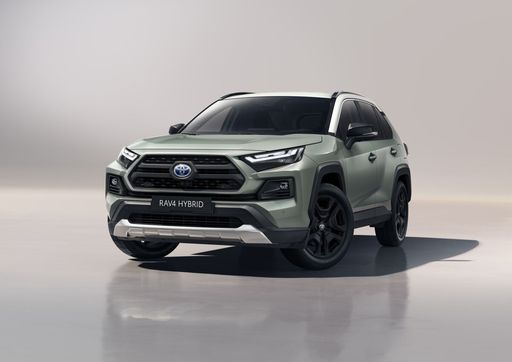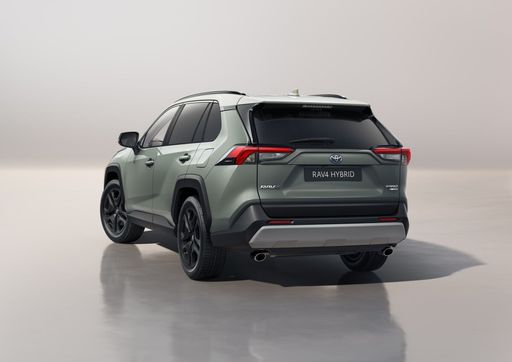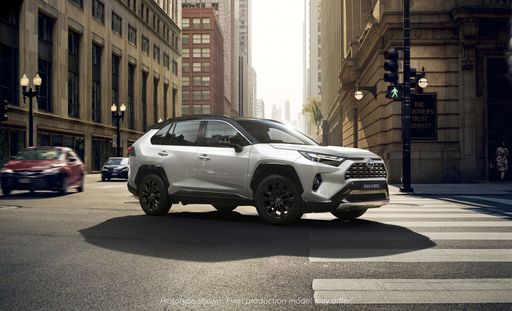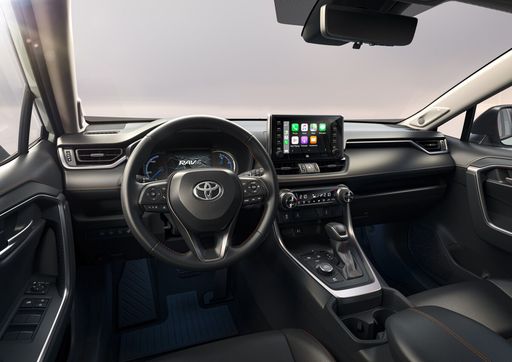SsangYong Torres vs Toyota RAV4 - Differences and prices compared
Compare performance (207 HP vs 306 HP), boot space and price (33800 £ vs 35100 £) at a glance. Find out which car is the better choice for you – SsangYong Torres or Toyota RAV4?
Costs and Efficiency:
Price and efficiency are key factors when choosing a car – and this is often where the real differences emerge.
SsangYong Torres has a minimal advantage in terms of price – it starts at 33800 £, while the Toyota RAV4 costs 35100 £. That’s a price difference of around 1286 £.
Fuel consumption also shows a difference: Toyota RAV4 manages with 1 L and is therefore convincingly more efficient than the SsangYong Torres with 7.90 L. The difference is about 6.90 L per 100 km.
As for range, the SsangYong Torres performs significantly better – achieving up to 462 km, about 387 km more than the Toyota RAV4.
Engine and Performance:
Power, torque and acceleration say a lot about how a car feels on the road. This is where you see which model delivers more driving dynamics.
When it comes to engine power, the Toyota RAV4 has a distinct edge – offering 306 HP compared to 207 HP. That’s roughly 99 HP more horsepower.
In terms of top speed, the SsangYong Torres performs slight better – reaching 194 km/h, while the Toyota RAV4 tops out at 180 km/h. The difference is around 14 km/h.
Space and Everyday Use:
Cabin size, boot volume and payload all play a role in everyday practicality. Here, comfort and flexibility make the difference.
Both vehicles offer seating for 5 people.
In curb weight, SsangYong Torres is to a small extent lighter – 1498 kg compared to 1745 kg. The difference is around 247 kg.
In terms of boot space, the SsangYong Torres offers somewhat more room – 703 L compared to 580 L. That’s a difference of about 123 L.
In maximum load capacity, the Toyota RAV4 performs hardly perceptible better – up to 1690 L, which is about 28 L more than the SsangYong Torres.
When it comes to payload, Toyota RAV4 hardly perceptible takes the win – 600 kg compared to 552 kg. That’s a difference of about 48 kg.
Who comes out on top?
Overall, the Toyota RAV4 shows itself to be dominates this comparison and secures the title of DriveDuel Champion.
It convinces with the more balanced overall package and proves to be the more versatile choice for everyday use.

Toyota RAV4
Costs and Consumption
View detailed analysis
Engine and Performance
View detailed analysis
Dimensions and Body
View detailed analysis
SsangYong Torres
SsangYong Torres cuts a rugged, purposeful silhouette that feels more expensive than its price tag, offering generously practical packaging and a no-nonsense feature set. It drives with surprisingly assured manners and genuine off-road appetite, making it a clever choice for buyers who want real SUV capability without badge snobbery.
detailsToyota RAV4
The Toyota RAV4 feels like a sensible friend on the road, marrying dependable practicality with a dash of SUV personality that keeps daily driving from turning dull. Comfortable and easy to live with, it looks tough without shouting and quietly gets the job done — a sensible pick for buyers who want versatility without drama.
details




|
|
|
|
|
Costs and Consumption |
|
|---|---|
|
Price
33800 - 44600 £
|
Price
35100 - 55700 £
|
|
Consumption L/100km
7.9 - 9.1 L
|
Consumption L/100km
1 - 5.6 L
|
|
Consumption kWh/100km
18.70 kWh
|
Consumption kWh/100km
-
|
|
Electric Range
462 km
|
Electric Range
75 km
|
|
Battery Capacity
-
|
Battery Capacity
-
|
|
co2
0 - 207 g/km
|
co2
22 - 128 g/km
|
|
Fuel tank capacity
50 L
|
Fuel tank capacity
55 L
|
Dimensions and Body |
|
|---|---|
|
Body Type
SUV
|
Body Type
SUV
|
|
Seats
5
|
Seats
5
|
|
Doors
5
|
Doors
5
|
|
Curb weight
1498 - 1618 kg
|
Curb weight
1745 - 1910 kg
|
|
Trunk capacity
703 L
|
Trunk capacity
520 - 580 L
|
|
Length
4700 mm
|
Length
4600 mm
|
|
Width
1890 mm
|
Width
1855 mm
|
|
Height
1710 mm
|
Height
1685 mm
|
|
Max trunk capacity
1662 L
|
Max trunk capacity
1604 - 1690 L
|
|
Payload
552 kg
|
Payload
390 - 600 kg
|
Engine and Performance |
|
|---|---|
|
Engine Type
Petrol, Electric
|
Engine Type
Full Hybrid, Plugin Hybrid
|
|
Transmission
Manuel, Automatic
|
Transmission
Automatic
|
|
Transmission Detail
Manual Gearbox, Automatic Gearbox, Reduction Gearbox
|
Transmission Detail
CVT
|
|
Drive Type
Front-Wheel Drive, All-Wheel Drive
|
Drive Type
Front-Wheel Drive, All-Wheel Drive
|
|
Power HP
163 - 207 HP
|
Power HP
218 - 306 HP
|
|
Acceleration 0-100km/h
-
|
Acceleration 0-100km/h
6 - 8.4 s
|
|
Max Speed
191 - 194 km/h
|
Max Speed
180 km/h
|
|
Torque
280 - 339 Nm
|
Torque
-
|
|
Number of Cylinders
4
|
Number of Cylinders
4
|
|
Power kW
120 - 152 kW
|
Power kW
160 - 225 kW
|
|
Engine capacity
1497 cm3
|
Engine capacity
2487 cm3
|
General |
|
|---|---|
|
Model Year
2023 - 2024
|
Model Year
2024 - 2025
|
|
CO2 Efficiency Class
G, A
|
CO2 Efficiency Class
D, B
|
|
Brand
SsangYong
|
Brand
Toyota
|
Is the SsangYong Torres offered with different drivetrains?
Available configurations include Front-Wheel Drive or All-Wheel Drive.
The prices and data displayed are estimates based on German list prices and may vary by country. This information is not legally binding.
